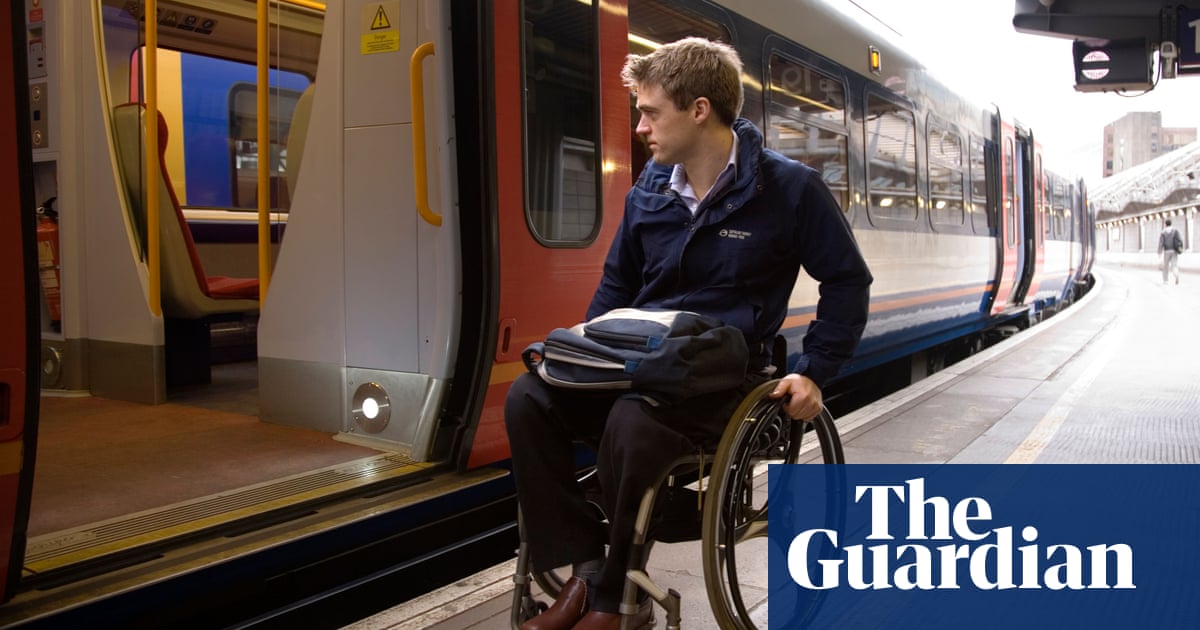Railway operators in the UK could soon have to pay out far greater sums in compensation to disabled passengers left unable to access trains despite booking assistance.
The rail regulator, the Office of Rail and Road (ORR), has warned companies running trains and stations that compensation claims for failures can no longer be limited to the cost of a ticket.
The ORR is set to toughen up accessibility rules after a disabled passenger was awarded about 10 times as much by a court than by the rail ombudsman – £1,200 instead of £125 – after pre-booked assistance to board a train failed to materialise.
Passengers with disabilities can request help with luggage, navigating stations and getting on and off trains, including the provision of ramps if needed, through the Passenger Assist service. It is bookable up to two hours before travel, but people report having often been left stranded on trains and platforms.
Tanni Grey-Thompson, the former Paralympic athlete, last yearbecame stranded at King’s Cross stationand dragged herself off the train before yelling for help.
Campaigners and lawyers have argued that railway policies and compensation do not reflect the breaches of equality law nor the levels of distress suffered.
The ORR has written to the industry to consult on changes after claims made byDoug Paulley, a disability rights campaigner, who was attempting to catch the Caledonian Sleeper night train service to Scotland from London Euston station in March 2023.
Paulley, 47, who uses a wheelchair, had booked assistance which did not arrive. Although he did eventually board with the help of train staff, he said the incident left him stressed.
He started a claim against Network Rail through legal avenues and the Rail Ombudsman. The ombudsman awarded Paulley, from Wetherby, Yorkshire, £100 for the assistance failure and £25 for complaints handling. He refused, and was eventually awarded £1,325 in the courts for the same incident.
He said: “I’m basically on a crusade to make the industry have to pay proper compensation for assistance failures. It isn’t a customer services issue, it is illegal discrimination. It has a massive impact on disabled travellers.
“Assistance failures are still so regular that it is clear the industry doesn’t care sufficiently about them to make them ‘never incidents’. I feel such failures should be given the same status and priority as safety incidents.”
Under the Vento banding system for payouts, the minimum “damages for injury to feelings” – covering discrimination under the Equality Act – is £1,200. Paulley said: “If rail operators get hit in the pocket for £1,200-plus for each assistance failure, this may help concentrate minds somewhat.”
Claire Hann, a solicitor at the law firm Leigh Day, sent the ORR a letter before action highlighting the case of Paulley. She said: “Unfortunately Mr Paulley’s case is not unique – it’s a widespread issue and it impacts many disabled passengers.
Sign up toBusiness Today
Get set for the working day – we'll point you to all the business news and analysis you need every morning
after newsletter promotion
“It’s not just that they miss the train, it’s that they are put in a vulnerable position, which can lead to distress, and ultimately affect whether they trust they can travel safely and independently. ”
The ORR said that, while most passenger assistance was done well, there were too many failures. A 2023-24 passenger satisfaction survey found that 5% of travellers using Passenger Assist were unable to complete their journey because assistance did not arrive. However, only 23% of those affected sought compensation.
The regulator said its focus was to ensure passengers got the necessary assistance, but made clear that compensation payouts should now be considered individually and not limited to the fare paid.
Stephanie Tobyn, the ORR’s director of strategy, policy and reform, said claims should be compensated on case by case, adding: “We’ve listened to affected passengers and we believe it is right to review redress policies for failed passenger assistance.”
A spokesperson for Rail Delivery Group, which represents station and train operators, said it wanted to “build a more accessible, inclusive railway”, adding: “We want every passenger to travel with confidence, and we are committed to improving the reliability of assistance across the network. While we acknowledge that challenges remain, we know how important it is to get this right every time.”
